|
|
|
Sort Order |
|
|
|
Items / Page
|
|
|
|
|
|
|
| Srl | Item |
| 1 |
ID:
140325
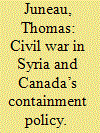

|
|
|
|
|
| Summary/Abstract |
The civil war in Syria has caused the deaths of more than 230,000 civilians and combatants, has led to one of the largest refugee crises in recent memory, and has destabilized the Levant. It therefore represents an extraordinarily challenging foreign policy conundrum. A wide variety of responses—ranging from the imposition of no-fly zones to doing nothing—have been considered in Ottawa and in allied capitals since 2011. Each one, however, raises potentially significant challenges.
This article explores how Canada has considered those alternatives. As is systematically the case for a non-great power, Canada’s policy options were shaped more by deliberations in allied capitals—especially Washington—and only thereafter by actual developments in Syria. After laying out Canada’s interests relative to the war in Syria, the article describes four policy alternatives that Canada has faced since 2011, as seen through the lenses of liberal pacifism, liberal interventionism, isolationism, and containment. Among this menu of deeply flawed options, containment has steadily emerged as Canada’s de facto approach. That approach has been correct: it is the least bad course of action available since it best allows Ottawa to protect and promote its interests. Nevertheless, Canada could take additional steps to implement a more comprehensive containment framework.
|
|
|
|
|
|
|
|
|
|
|
|
|
|
|
|
| 2 |
ID:
142173
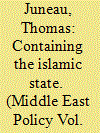

|
|
|
|
|
| Summary/Abstract |
In early 2014, the organization then known as the Islamic State in Iraq and the Levant swept across northwestern Iraq while simultaneously expanding the territory under its control in eastern Syria. The group, which renamed itself the Islamic State (IS) in June 2014, is led by members of what used to be al-Qaeda in Iraq. It has incorporated Iraqi Sunnis who hold grievances against the Shia-dominated government in Baghdad (mostly former members of Saddam Hussein's regime and alienated tribes) as well as a variety of armed Syrian opposition groups. By mid-2014, IS threatened to further expand in Iraq and Syria, while there were plausible fears that it could cross into neighboring countries, especially Jordan. It has entrenched sectarian divisions and further weakened the state in Iraq and has worsened an already devastating civil war in Syria. It represents a magnet and a safe haven for terrorists in the heart of the Middle East.
|
|
|
|
|
|
|
|
|
|
|
|
|
|
|
|
| 3 |
ID:
160986
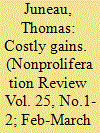

|
|
|
|
|
| Summary/Abstract |
Iran’s nuclear ambitions have been at the center of Middle Eastern politics and a global nonproliferation source of concern for almost twenty years. Much has been written on the topic, but one important question has received less attention: was it beneficial for the Islamic Republic? How have the gains and losses associated with its nuclear pursuits compared with each other? This article attempts to provide a comprehensive assessment of the costs and benefits of Iran’s nuclear program. We start with an overview of the literature on why states pursue nuclear programs. This allows us to build a list of objectives that states can hope to achieve through their nuclear ambitions. We use these as yardsticks to assess the gains Iran has reaped and the losses it has incurred. This leads to the conclusion that, although Iran has earned some benefits from its nuclear program, these have been costly; ultimately, the costs have exceeded the benefits. We conclude by reflecting on what the Iranian case tells us more broadly about the study of nuclear proliferation.
|
|
|
|
|
|
|
|
|
|
|
|
|
|
|
|
| 4 |
ID:
165793
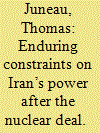

|
|
|
|
|
| Summary/Abstract |
THOMAS JUNEAU assesses the 2016 nuclear deal with Iran. He argues that critics of this deal incorrectly argued that it enhanced Iran’s position in the Middle East. He concludes that even under the deal Iran’s ability to gain power and to exert regional influence remained constrained.
|
|
|
|
|
|
|
|
|
|
|
|
|
|
|
|
| 5 |
ID:
136202


|
|
|
|
|
| Summary/Abstract |
Iran is alone in the world. Its acute strategic loneliness is primarily the result of structural factors inherent in its place in the regional and international systems and is largely independent of the actions of whoever governs the country. Its international posture does not render cooperation with other states impossible, nor does it predetermine a condition of permanent conflict with its neighbors. Strategic loneliness, however, explains why Iran has very limited common interests with its neighbors and why cooperation is difficult and costly to achieve. Tehran's policies, as a result, can worsen or improve the situation but cannot fundamentally change it.
|
|
|
|
|
|
|
|
|
|
|
|
|
|
|
|
| 6 |
ID:
145290


|
|
|
|
|
| Summary/Abstract |
For years, mounting instability had led many to predict the imminent collapse of Yemen. These forecasts became reality in 2014 as the country spiralled into civil war. The conflict pits an alliance of the Houthis, a northern socio-political movement that had been fighting the central government since 2004, alongside troops loyal to a former president, Ali Abdullah Saleh, against supporters and allies of the government overthrown by the Houthis in early 2015. The war became regionalized in March 2015 when a Saudi Arabia-led coalition of ten mostly Arab states launched a campaign of air strikes against the Houthis. According to Saudi Arabia, the Houthis are an Iranian proxy; they therefore frame the war as an effort to counter Iranian influence. This article will argue, however, that the Houthis are not Iranian proxies; Tehran's influence in Yemen is marginal. Iran's support for the Houthis has increased in recent years, but it remains low and is far from enough to significantly impact the balance of internal forces in Yemen. Looking ahead, it is unlikely that Iran will emerge as an important player in Yemeni affairs. Iran's interests in Yemen are limited, while the constraints on its ability to project power in the country are unlikely to be lifted. Tehran saw with the rise of the Houthis a low cost opportunity to gain some leverage in Yemen. It is unwilling, however, to invest larger amounts of resources. There is, as a result, only limited potential for Iran to further penetrate Yemen.
|
|
|
|
|
|
|
|
|
|
|
|
|
|
|
|
| 7 |
ID:
097069


|
|
|
|
|
| Publication |
2010.
|
| Summary/Abstract |
This article argues that using graphic novels is an effective and valuable pedagogical tool to enhance the teaching of international relations, and specifically the Israeli-Palestinian conflict. Graphic novels combine the best of film and prose in delivering a cognitive and affective experience that allows students to access the subject matter in a manner that complements the use of more conventional textbooks. Three such novels-Palestine, by Joe Sacco (2001), Exit Wounds, by Rutu Modan (2007), and Waltz with Bashir, by Ari Folman and David Polonsky (2009)-raise a number of important and relevant themes such as life under occupation and the shadow of terrorism, the intractability of conflict, the sources of violence, tensions within Israeli society, and collective memory and identity. After reviewing these three novels, this article discusses the benefits and challenges associated with using graphic novels in the political science classroom.
|
|
|
|
|
|
|
|
|
|
|
|
|
|
|
|
| 8 |
ID:
175692


|
|
|
|
|
| Summary/Abstract |
Some argue that President Barack Obama’s Middle East policies were consistent with realism. This article examines this claim and finds that Obama’s policies were only partly consistent with defensive realism. He exercised restraint in the use of force by resisting pressure to intervene on a large-scale in Syria and in his efforts to counter the Islamic State. The nuclear deal with Iran was also consistent with realism. In other areas, however, the gap between his policies and realist prescriptions was wide. The article then analyzes the implications of these gaps and suggests options to steer policy further toward realism.
|
|
|
|
|
|
|
|
|
|
|
|
|
|
|
|
| 9 |
ID:
155774
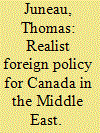

|
|
|
|
|
| Summary/Abstract |
Canada’s policies in the Middle East receive large amounts of media attention, but there is surprisingly little scholarly work about them. Of the few studies on the topic, moreover, most focus on analyzing past or current policies. This is certainly useful, but there is virtually no academic work focused on prescription. There is, as such, a need for theoretically informed studies laying out the rationale for a sound Canadian policy framework for the region. In this context, this paper proposes to look at Canada’s Middle East policies from a realist perspective. What are Canada’s interests? How should these translate into policy? The goal here is not to make specific prescriptions regarding each conflict or bilateral relation, but rather to propose a comprehensive framework to guide Ottawa’s broad approach to the Middle East.
|
|
|
|
|
|
|
|
|
|
|
|
|
|
|
|
| 10 |
ID:
133622
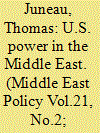

|
|
|
|
|
| Publication |
2014.
|
| Summary/Abstract |
It has become common to hear that American power in the Middle East is waning. The recent U.S.-Russia deal on the elimination of Syria's chemical-weapons program, for example, has even led some to talk of U.S. weakness in the region.2 This article instead argues that American power in the Middle East is not declining but is, in fact, slightly increasing, due principally to U.S. military domination, the strong positions of its regional partners and the stagnation or decline of its rivals. It is true that U.S. ambition in the Middle East is diminishing, albeit only slightly. This is distinct, however, from power. A pronounced and durable decrease in U.S. regional ambition, moreover, is not sustainable. Because of structural pressures, it is difficult for the United States to more than marginally reduce its regional presence. It is not losing its grip on the Middle East but trying, with only partial success, to loosen it.3
|
|
|
|
|
|
|
|
|
|
|
|
|
|
|
|
| 11 |
ID:
173663


|
|
|
|
|
| Summary/Abstract |
In 2019 the United Arab Emirates undertook to recalibrate its intervention in the Yemen conflict, without ending it altogether.
|
|
|
|
|
|
|
|
|
|
|
|
|
|
|
|
| 12 |
ID:
098674


|
|
|
| 13 |
ID:
098719


|
|
|
| 14 |
ID:
123666


|
|
|
|
|
| Publication |
2013.
|
| Summary/Abstract |
Yemen, the poorest and most populous country on the Arabian Peninsula, has long been a prime candidate to join the failed state club. After the wave of uprisings sweeping through the Middle East reached the country in early 2011, the already high levels of instability and violence reached new heights and threatened to accelerate a steady march towards collapse. Even though a variety of scenarios can be identified for the future of Yemen, the most likely paths all imply a period of prolonged instability. This will carry significant consequences for regional and international security, in particular, by providing al Qaeda's local franchise with an attractive safe haven from which to plan and launch operations.
|
|
|
|
|
|
|
|
|
|
|
|
|
|
|
|
|
|
|
|
|